Related Research Articles
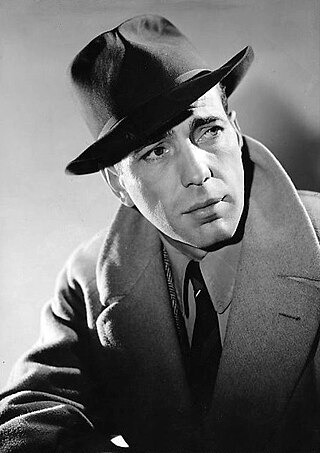
Humphrey DeForest Bogart, colloquially nicknamed Bogie, was an American film and stage actor. His performances in classic Hollywood cinema films made him an American cultural icon. In 1999, the American Film Institute selected Bogart as the greatest male star of classic American cinema.

Henry VIII was King of England from 22 April 1509 until his death in 1547. Henry is best known for his six marriages, and his efforts to have his first marriage annulled. His disagreement with Pope Clement VII about such an annulment led Henry to initiate the English Reformation, separating the Church of England from papal authority. He appointed himself Supreme Head of the Church of England and dissolved convents and monasteries, for which he was excommunicated by the pope.

James Maitland "Jimmy" Stewart was an American actor. Known for his distinctive drawl and everyman screen persona, Stewart's film career spanned 80 films from 1935 to 1991. With the strong morality he portrayed both on and off the screen, he epitomized the "American ideal" in the mid-twentieth century. In 1999, the American Film Institute (AFI) ranked him third on its list of the greatest American male actors. He received numerous honors including the Screen Actors Guild Life Achievement Award in 1968, the AFI Life Achievement Award in 1980, the Kennedy Center Honor in 1983, as well as the Academy Honorary Award and Presidential Medal of Freedom, both in 1985.

Avram Noam Chomsky is an American professor and public intellectual known for his work in linguistics, political activism, and social criticism. Sometimes called "the father of modern linguistics", Chomsky is also a major figure in analytic philosophy and one of the founders of the field of cognitive science. He is a laureate professor of linguistics at the University of Arizona and an institute professor emeritus at the Massachusetts Institute of Technology (MIT). Chomsky has written more than 150 books on topics such as linguistics, war, and politics. Ideologically, he aligns with anarcho-syndicalism and libertarian socialism.

Diana, Princess of Wales, was a member of the British royal family. She was the first wife of King Charles III and mother of Prince William and Prince Harry. Her activism and glamour made her an international icon, and earned her enduring popularity.

Stanley Kubrick was an American film director, producer, screenwriter and photographer. Widely considered one of the greatest filmmakers of all time, his films—almost all of which are adaptations of novels or short stories—cover a wide range of genres and feature innovative cinematography, dark humor, realistic attention to detail and extensive set designs.

Steven Allan Spielberg is an American film director, producer and screenwriter. A major figure of the New Hollywood era and pioneer of the modern blockbuster, he is the most commercially successful director in history. He is the recipient of many accolades, including three Academy Awards, two BAFTA Awards, and four Directors Guild of America Awards, as well as the AFI Life Achievement Award in 1995, the Kennedy Center Honor in 2006, the Cecil B. DeMille Award in 2009 and the Presidential Medal of Freedom in 2015. Seven of his films have been inducted into the National Film Registry by the Library of Congress as "culturally, historically or aesthetically significant".

Shinto is a religion from Japan. Classified as an East Asian religion by scholars of religion, its practitioners often regard it as Japan's indigenous religion and as a nature religion. Scholars sometimes call its practitioners Shintoists, although adherents rarely use that term themselves. There is no central authority in control of Shinto, with much diversity of belief and practice evident among practitioners.
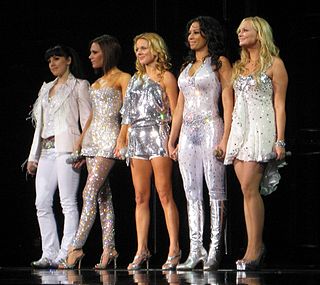
The Spice Girls are an English girl group formed in 1994, consisting of Melanie Brown a.k.a. Mel B ; Melanie Chisholm, a.k.a. Mel C ; Emma Bunton ; Geri Halliwell ; and Victoria Beckham. With their "girl power" mantra, they redefined the girl-group concept by targeting a young female fanbase. They led the teen pop resurgence of the 1990s, were a major part of the Cool Britannia era, and became pop culture icons of the decade.

Cary Grant was an English-American actor. He was known for his Mid-Atlantic accent, debonair demeanor, light-hearted approach to acting, and sense of comic timing. He was one of classic Hollywood's definitive leading men. He was nominated twice for the Academy Award, and was honored with Academy Honorary Award in 1970, and the Kennedy Center Honor in 1981. He was named by American Film Institute the second greatest male star of the Golden Age of Hollywood in 1999.

Salvador Domingo Felipe Jacinto Dalí i Domènech, Marquess of Dalí of Púbol, known as Salvador Dalí, was a Spanish surrealist artist renowned for his technical skill, precise draftsmanship, and the striking and bizarre images in his work.

Edward I, also known as Edward Longshanks and the Hammer of the Scots, was King of England from 1272 to 1307. Concurrently, he was Lord of Ireland, and from 1254 to 1306, he ruled Gascony as Duke of Aquitaine in his capacity as a vassal of the French king. Before his accession to the throne, he was commonly referred to as the Lord Edward. The eldest son of Henry III, Edward was involved from an early age in the political intrigues of his father's reign. In 1259, he briefly sided with a baronial reform movement, supporting the Provisions of Oxford. After reconciliation with his father, he remained loyal throughout the subsequent armed conflict, known as the Second Barons' War. After the Battle of Lewes, Edward was held hostage by the rebellious barons, but escaped after a few months and defeated the baronial leader Simon de Montfort at the Battle of Evesham in 1265. Within two years the rebellion was extinguished and, with England pacified, Edward left to join the Ninth Crusade to the Holy Land in 1270. He was on his way home in 1272 when he was informed of his father's death. Making a slow return, he reached England in 1274 and was crowned at Westminster Abbey.
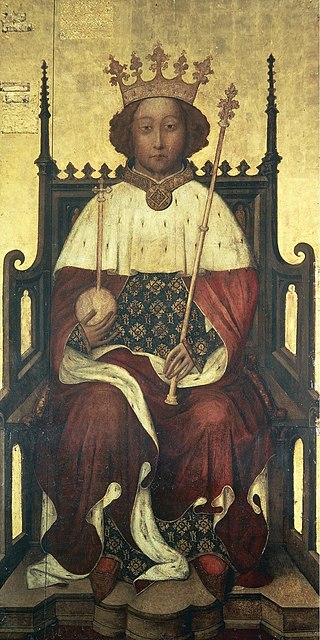
Richard II, also known as Richard of Bordeaux, was King of England from 1377 until he was deposed in 1399. He was the son of Edward the Black Prince, Prince of Wales, and Joan, Countess of Kent. Richard's father died in 1376, leaving Richard as heir apparent to his grandfather, King Edward III; upon the latter's death, the 10-year-old Richard succeeded to the throne.
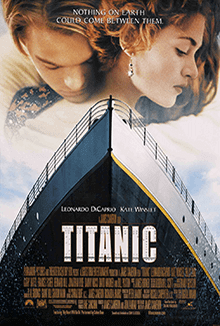
Titanic is a 1997 American disaster film directed, written, produced, and co-edited by James Cameron. Incorporating both historical and fictionalized aspects, it is based on accounts of the sinking of RMS Titanic in 1912. Kate Winslet and Leonardo DiCaprio star as members of different social classes who fall in love during the ship's maiden voyage. The film also features Billy Zane, Kathy Bates, Frances Fisher, Gloria Stuart, Bernard Hill, Jonathan Hyde, Victor Garber and Bill Paxton.
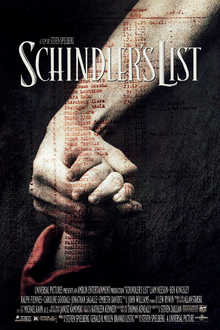
Schindler's List is a 1993 American epic historical drama film directed and produced by Steven Spielberg and written by Steven Zaillian. It is based on the 1982 novel Schindler's Ark by Australian novelist Thomas Keneally. The film follows Oskar Schindler, a German industrialist who saved more than a thousand mostly Polish–Jewish refugees from the Holocaust by employing them in his factories during World War II. It stars Liam Neeson as Schindler, Ralph Fiennes as SS officer Amon Göth, and Ben Kingsley as Schindler's Jewish accountant Itzhak Stern.

Prince Albert of Saxe-Coburg and Gotha was Prince Consort of the United Kingdom upon the their marriage on 10 February 1840 until his death in 1861.

ʿAlī ibn Abī Ṭālib was the last Caliph of the Rashidun Caliphate, the successor state to the Islamic prophet Muhammad's political dominions. He is considered by Shia Muslims to be the first Imam, the rightful religious and political successor to Muhammad. The issue of succession caused a major rift between Muslims and divided them into two major branches: Shia following an appointed hereditary leadership among Ali's descendants, and Sunni following political dynasties. Ali's assassination in the Grand Mosque of Kufa by a Kharijite coincided with the rise of the Umayyad Caliphate. The Imam Ali Shrine and the city of Najaf were built around Ali's tomb and it is visited yearly by millions of devotees.
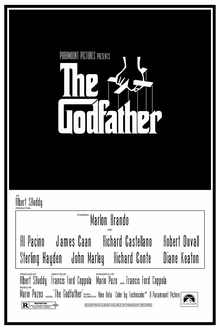
The Godfather is a 1972 American epic crime film directed by Francis Ford Coppola, who co-wrote the screenplay with Mario Puzo, based on Puzo's best-selling 1969 novel of the same title. The film stars Marlon Brando, Al Pacino, James Caan, Richard Castellano, Robert Duvall, Sterling Hayden, John Marley, Richard Conte, and Diane Keaton. It is the first installment in The Godfather trilogy, chronicling the Corleone family under patriarch Vito Corleone (Brando) from 1945 to 1955. It focuses on the transformation of his youngest son, Michael Corleone (Pacino), from reluctant family outsider to ruthless mafia boss.

Ernesto "Che" Guevara was an Argentine Marxist revolutionary, physician, author, guerrilla leader, diplomat, and military theorist. A major figure of the Cuban Revolution, his stylized visage has become a ubiquitous countercultural symbol of rebellion and global insignia in popular culture.

Ganesha, also spelled Ganesh, and also known as Ganapati, Vinayaka, and Pillaiyar, is one of the best-known and most worshipped deities in the Hindu pantheon and is the Supreme God in the Ganapatya sect. His depictions are found throughout India. Hindu denominations worship him regardless of affiliations. Devotion to Ganesha is widely diffused and extends to Jains and Buddhists and beyond India.
References
- ↑ "1997年 邦楽ヒット曲 ランキング". nendai-ryuukou.com. Retrieved 18 August 2016.
This list of songs or music-related items is incomplete; you can help by adding missing items. (October 2021) |